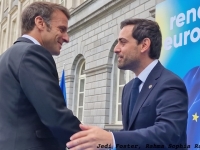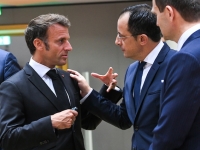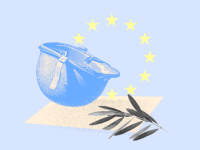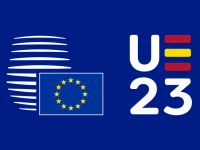Politics
PRES. MACRON CANCELS PRESS CONF AT EUROPEAN COUNCIL 29-30 JUNE FLEW BACK HOME
DUE TO FRENCH RIOTS OVER NAHEL’S DEATH
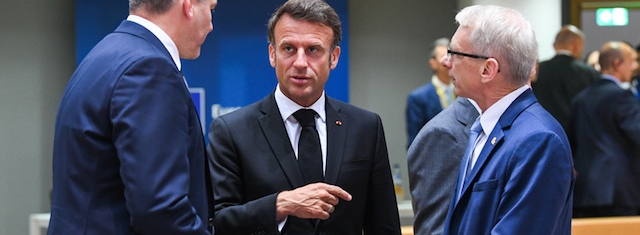
Pres. Macron & EU Leaders, Brussels (Source: European Union)
USPA NEWS -
At the invitation of the Renew Europe's President Stephane Sejourne (french Former Advisor of President Emmanuel Macron), Renew Europe Leaders met at the Palais des Académies in Brussels on Thursday 29 June 2023, ahead of the European Council meeting of the same day and the following day.
In Brussels, the twenty seven EU leaders discussed (29-30June23) continued support for Ukraine, notably sustainable military and financial support, and how to boost long-term economic strength and resilience in the EU. They also discussed migration, the EU-China relationship and external relations, in a moment where geopolitical issues are raised and must be tackled as far as Ukraine’s NATO membership is concern. Indeed, this summit is held ahead of the next NATO Summit in ViIlinus (10-12 July 2023). The European Council held an exchange of views with NATO Secretary General Stoltenberg on EU-NATO cooperation and Euro-Atlantic security, in particular following the signature of the third joint declaration on 10 January 2023. President Macron, meanwhile had to leave on Friday, June 30 the summit of the European Union before its end and, which is not like him, and even canceled his press conference
In Brussels, the twenty seven EU leaders discussed (29-30June23) continued support for Ukraine, notably sustainable military and financial support, and how to boost long-term economic strength and resilience in the EU. They also discussed migration, the EU-China relationship and external relations, in a moment where geopolitical issues are raised and must be tackled as far as Ukraine’s NATO membership is concern. Indeed, this summit is held ahead of the next NATO Summit in ViIlinus (10-12 July 2023). The European Council held an exchange of views with NATO Secretary General Stoltenberg on EU-NATO cooperation and Euro-Atlantic security, in particular following the signature of the third joint declaration on 10 January 2023. President Macron, meanwhile had to leave on Friday, June 30 the summit of the European Union before its end and, which is not like him, and even canceled his press conference
At the invitation of the Renew Europe's President Stephane Sejourne (french Former Advisor of President Emmanuel Macron), Renew Europe Leaders met at the Palais des Académies in Brussels on Thursday 29 June 2023, ahead of the European Council meeting of the same day and the following day.
In Brussels, the twenty seven EU leaders discussed (29-30June23) continued support for Ukraine, notably sustainable military and financial support, and how to boost long-term economic strength and resilience in the EU. They also discussed migration, the EU-China relationship and external relations, in a moment where geopolitical issues are raised and must be tackled as far as Ukraine’s NATO membership is concern. Indeed, this summit is held ahead of the next NATO Summit in ViIlinus (10-12 July 2023). The European Council held an exchange of views with NATO Secretary General Stoltenberg on EU-NATO cooperation and Euro-Atlantic security, in particular following the signature of the third joint declaration on 10 January 2023. President Macron, meanwhile had to leave on Friday, June 30 around 1:00 p.m., the summit of the European Union before its end and, which is not like him, and even canceled his final press conference to return to Paris and preside a crisis meeting on the riots in France.
Indeed, the French head of state provoked a meeting of the interministerial crisis unit after three consecutive nights of urban violence following the death of Nahel, 17, killed by a police officer on June 27 in Nanterre, during a a control in Nanterre. It was therefore the German Chancellor Olaf Sholtz, who represented the head of the President of the Republic, in his absence for the rest of the European Council. During the riots, several thousand young people were arrested and taken into custody following the violence and looting for three nights. PM Elisabeth Borne spoke of "very violent individuals, especially very young people who attack our police stations, our town halls, our public facilities". "EU leaders reiterated their resolute condemnation of Russia’s war and unwavering solidarity with Ukraine and its people. So far, the EU and its member states have provided over €77 billion to Ukraine. They will continue to strongly support Ukraine’s economy, society, armed forces and future reconstruction. The EU will also provide flexible financial assistance to reinforce support for displaced persons in Ukraine and in the EU »" Source European Council
We publish the full Joint statement releases by the European Union, as it was delivered, June 30th, 2023.
I. UKRAINE
1. The European Council reiterates its resolute condemnation of Russia’s war of aggression against Ukraine, which constitutes a manifest violation of the UN Charter, and recalls the European Union’s unwavering support for Ukraine’s independence, sovereignty and territorial integrity within its internationally recognised borders and its inherent right of self-defence against the Russian aggression. The European Union will continue to provide strong financial, economic, humanitarian, military and diplomatic support to Ukraine and its people for as long as it takes.
2. The European Council reconfirms the EU’s readiness to provide sustainable military support to Ukraine for as long as it takes, notably through the EU Military Assistance Mission and the European Peace Facility. It took stock of the progress in the delivery and joint procurement of one million rounds of artillery ammunition and missiles for Ukraine. It underlines the importance of Member States’ continued efforts to help meet Ukraine’s pressing military and defence needs, without prejudice to the specific character of the security and defence policy of certain Member States, and taking into account the security and defence interests of all Member States.
The European Union and Member States stand ready to contribute, together with partners, to future security commitments to Ukraine, which will help Ukraine defend itself in the long term, deter acts of aggression and resist destabilisation efforts. In this regard, they will swiftly consider the modalities of such contribution. These commitments will be taken in full respect of the security and defence policy of certain Member States and taking into account the security and defence interests of all Member States. The European Council will remain seized of the matter.
4. The European Council condemns in the strongest terms the deliberate destruction of the dam at the Kakhovka hydroelectric power plant, which has devastating humanitarian, ecological, agricultural and economic repercussions and puts at risk the safety and security of the Zaporizhzhia nuclear power plant. The European Union and its Member States stand ready to provide further support to Ukraine, in addition to the emergency assistance for relief efforts provided via the Union Civil Protection Mechanism. The European Union fully supports the International Atomic Energy Agency’s work to strengthen nuclear safety and security in Ukraine.
5. The European Union and its Member States will intensify their diplomatic outreach efforts and continue to cooperate with Ukraine and other countries to ensure the widest possible international support for the key principles and objectives of Ukraine’s Peace Formula, including through an upcoming Global Peace Summit. Any initiative for a comprehensive, just and lasting peace in Ukraine must be based on full respect for its independence, sovereignty and territorial integrity within its internationally recognised borders.
The European Council reiterates its call for the European Investment Bank, in close cooperation with the Commission and International Financial Institutions, to step up its support for Ukraine’s most urgent infrastructure needs. The European Union also remains committed to supporting Ukraine’s repair, recovery and reconstruction, in coordination with international partners, including in the areas of psychological and psychosocial rehabilitation and demining assistance. Moreover, the European Council took stock of the work done regarding Russia’s immobilised assets, and invites the Council, the High Representative and the Commission to take work forward, in accordance with EU and international law, and in coordination with partners.
7. The European Union remains firmly committed to ensuring that Russia is held fully accountable for its war of aggression against Ukraine. The European Council welcomes the fact that the International Centre for the Prosecution of the Crime of Aggression against Ukraine (ICPA) is ready to start its support operations. The European Council took stock of efforts to establish a tribunal for the prosecution of the crime of aggression against Ukraine, including work done in the Core Group, and calls for the work to continue. The tribunal should enjoy the broadest cross-regional support and legitimacy. The European Council welcomes the adoption of the Ljubljana-The Hague Convention on International Cooperation in the Investigation and Prosecution of the Crime of Genocide, Crimes against Humanity, War Crimes and other International Crimes, and calls on all countries to become parties to the Convention as soon as possible. The European Council also welcomes the establishment of the Council of Europe’s Register of Damage Caused by the Aggression of the Russian Federation Against Ukraine and calls for work to continue
The European Council condemns in the strongest terms Russia’s unlawful deportation and transfer to Russia and to Belarus of Ukrainian children and other civilians. It calls on the Russian Federation and Belarus to immediately ensure their safe return. 9. The European Council discussed efforts to further increase pressure on Russia in order to weaken its ability to wage its war of aggression, including through sanctions, their full and effective implementation and the prevention of their circumvention. In this context, it welcomes the adoption of the 11th package of sanctions. The European Council calls on the co-legislators to swiftly finalise work on the proposed Directive approximating criminal offences and penalties for the violation of Union restrictive measures.
10. The European Council condemns the continued military support for Russia’s war of aggression provided by Iran and Belarus. Belarus must stop allowing Russian armed forces to use its territory, including for the deployment of tactical nuclear weapons. Iran must stop providing drones to Russia. 11. The European Council acknowledges Ukraine’s commitment and substantial efforts to meet the required conditions in its EU accession process. It encourages Ukraine to continue on its path of reforms. The European Union will continue to work closely with Ukraine and support its efforts to fully meet all conditions.
12. The European Union will continue to support the Republic of Moldova in addressing the challenges it faces as a consequence of the Russian aggression against Ukraine and in reform efforts on its European path. The European Council acknowledges the Republic of Moldova’s commitment and substantial efforts to meet the required conditions in its EU accession process. It welcomes the recently presented support package and launch of the civilian EU Partnership Mission. It commends the Republic of Moldova for the successful organisation of the second European Political Community Summit on 1 June 2023.
The European Council takes note of the steps recently taken by the Georgian authorities. The European Union will continue to work closely with Georgia to support it in meeting the required conditions to advance on its European path.
The European Council takes note of the steps recently taken by the Georgian authorities. The European Union will continue to work closely with Georgia to support it in meeting the required conditions to advance on its European path.
14. Russia continues to weaponise food, thus undermining global food security. The European Council is deeply concerned by the continued slowdown in the implementation of the Black Sea Grain Initiative and calls for the swift and full resumption of its operations. The EU’s Solidarity Lanes remain instrumental in bolstering global food security.
15. The European Union reiterates its commitment to reinforce support for displaced persons, both in Ukraine and in the European Union, including through adequate and flexible financial assistance to the Member States who carry the largest burden of the medical, education and living costs of refugees.
15. The European Union reiterates its commitment to reinforce support for displaced persons, both in Ukraine and in the European Union, including through adequate and flexible financial assistance to the Member States who carry the largest burden of the medical, education and living costs of refugees.
II. ECONOMY
16. The European Council held an exchange of views on the current economic situation.
17. Following reporting by the Council Presidency and the Commission, the European Council took stock of progress in enhancing Europe’s long-term competitiveness and productivity, with a particular focus on deepening the Single Market, preserving its integrity, its four freedoms and its openness, ensuring a level playing field and creating a growth-enhancing regulatory framework that reduces administrative burden, while strengthening industrial policy and reducing strategic dependencies, in particular in the most sensitive areas.
16. The European Council held an exchange of views on the current economic situation.
17. Following reporting by the Council Presidency and the Commission, the European Council took stock of progress in enhancing Europe’s long-term competitiveness and productivity, with a particular focus on deepening the Single Market, preserving its integrity, its four freedoms and its openness, ensuring a level playing field and creating a growth-enhancing regulatory framework that reduces administrative burden, while strengthening industrial policy and reducing strategic dependencies, in particular in the most sensitive areas.
Recalling its conclusions of March 2023 and in light of the acceleration of the Union’s twin transitions towards a green and digital economy, the European Council: a) invites the co-legislators to accelerate work on the proposals for a Net Zero Industry Act and a Critical Raw Materials Act with a view to reaching an agreement before the end of the current legislative cycle and calls for work to be taken forward on the development of strategic technologies and strengthening their value chains; b) stresses the importance of the European Union becoming a prime location for the development of artificial intelligence (AI) and the need to rapidly seize the opportunities and address the risks of specific uses of AI with a view to fostering innovation and trust, promoting investment and uptake, and contributing to setting global standards, and calls on the co-legislators to promptly finalise work on the AI Act; c) invites the Commission to propose an initiative for urgent measures to ensure sufficient production and availability of the most critical medicines and components in Europe and to diversify international supply chains, while inviting the co-legislators to continue and accelerate work on the proposed reform of the pharmaceutical legislation, including as regards access to medicines and an innovative and competitive pharmaceutical sector; d) welcomes the entry into force of the Unified Patent Court Agreement for the participating Member States, and the consequent entry into operation of the unitary patent, which will help boost innovation and competitiveness; e) looks forward to the first annual progress review on enhancing the Union’s competitiveness and increasing productivity and growth at its March 2024 meeting;
calls for an independent High-Level Report on the future of the Single Market to be presented at its meeting of March 2024 and invites the incoming presidencies of the Council and the Commission to take this work forward, in consultation with the Member States; g) invites the Commission to present a toolbox to address demographic challenges and notably their impact on Europe’s competitive edge.
19. The Commission reported on the discussions with the United States on the effects of the Inflation Reduction Act (IRA). The European Council invites the Commission, with the support of the Member States, to assess the impact of the IRA on investment and the effectiveness of measures taken in response by the European Union and its Member States, and to continue its work on monitoring and improving investment conditions.
20. The European Council stresses the need to enhance the Union’s economic resilience and security in order to defend the Union’s interests globally while preserving an open economy. It calls for an approach that provides proportionate, precise and targeted answers to security challenges on the basis of a risk assessment.
19. The Commission reported on the discussions with the United States on the effects of the Inflation Reduction Act (IRA). The European Council invites the Commission, with the support of the Member States, to assess the impact of the IRA on investment and the effectiveness of measures taken in response by the European Union and its Member States, and to continue its work on monitoring and improving investment conditions.
20. The European Council stresses the need to enhance the Union’s economic resilience and security in order to defend the Union’s interests globally while preserving an open economy. It calls for an approach that provides proportionate, precise and targeted answers to security challenges on the basis of a risk assessment.
21. The European Council held a discussion on the integrated country-specific recommendations as discussed by the Council, thus allowing the conclusion of the 2023 European Semester. 22. The European Council invites the Council to take work forward on the Economic Governance Review, with a view to concluding legislative work in 2023. 23. The European Council takes note of the proposed revision of the Multiannual Financial Framework. The European Council will remain seized of the matter.
I. SECURITY AND DEFENCE
24. The European Council took stock of work carried out to implement its previous conclusions, the March 2022 Versailles Declaration and the Strategic Compass.
25. The European Council recalls the need to strengthen the technological and industrial base of the European defence sector and to make it more innovative, competitive and resilient, in particular in a new strategic environment which requires defence readiness and a significant increase in Europe’s long-term strategic capacity to take more responsiblity for its own defence.
26. In this regard, the European Council: a) calls for work to be taken forward on all strands of action for the delivery and joint procurement of ammunition and missiles, notably on the Act in Support of Ammunition Production (ASAP) with a view to its swift adoption; b) welcomes the agreement reached on the European Defence Industry Reinforcement through common Procurement Act (EDIRPA); c) calls on the Commission to present a proposal for a European Defence Investment Programme (EDIP) to reinforce the capacity and resilience of the European defence technological and industrial base, including SMEs.
24. The European Council took stock of work carried out to implement its previous conclusions, the March 2022 Versailles Declaration and the Strategic Compass.
25. The European Council recalls the need to strengthen the technological and industrial base of the European defence sector and to make it more innovative, competitive and resilient, in particular in a new strategic environment which requires defence readiness and a significant increase in Europe’s long-term strategic capacity to take more responsiblity for its own defence.
26. In this regard, the European Council: a) calls for work to be taken forward on all strands of action for the delivery and joint procurement of ammunition and missiles, notably on the Act in Support of Ammunition Production (ASAP) with a view to its swift adoption; b) welcomes the agreement reached on the European Defence Industry Reinforcement through common Procurement Act (EDIRPA); c) calls on the Commission to present a proposal for a European Defence Investment Programme (EDIP) to reinforce the capacity and resilience of the European defence technological and industrial base, including SMEs.
27. The European Council welcomes the decision to further increase the financial ceiling of the European Peace Facility by EUR 3.5 billion in order to preserve the global geographical scope of the Facility, to continue providing military support to Ukraine and to maintain the Union’s ability to prevent and swiftly respond to crises and conflicts and to build capacity through its training missions.
The European Council welcomes the progress in the implementation of the Strategic Compass, including as regards cyber security and defence, hybrid threats, military mobility, space and maritime security. It also welcomes work undertaken to strengthen Civilian CSDP, in particular the recent approval of the new Civilian CSDP Compact.
29. The European Council welcomes the work on the EU Policy on Cyber Defence and on the review of the EU Cyber Diplomacy Toolbox to strengthen the ability to prevent, deter and respond to cyberattacks. IV. CHINA
30. The European Council continued its strategic discussion on the EU’s relations with China and reaffirmed the EU’s multifaceted policy approach towards China, where it is simultaneously a partner, a competitor and a systemic rival. Despite their different political and economic systems, the European Union and China have a shared interest in pursuing constructive and stable relations, anchored in respect for the rules-based international order, balanced engagement and reciprocity.
31. The European Union will continue to engage with China to tackle global challenges and encourages China to take more ambitious action on climate change and biodiversity, health and pandemic preparedness, food security, disaster reduction, debt relief, and humanitarian assistance.
32. The European Union and China continue to be important trade and economic partners. The European Union will seek to ensure a level playing field, so that the trade and economic relationship is balanced, reciprocal and mutually beneficial. In line with the Versailles agenda, the European Union will continue to reduce critical dependencies and vulnerabilities, including in its supply chains, and will de-risk and diversify where necessary and appropriate. The European Union does not intend to decouple or to turn inwards
As a permanent member of the UN Security Council, China has a special responsibility in upholding the rules-based international order, the United Nations Charter and international law. Hence, the European Council calls on China to press Russia to stop its war of aggression, and immediately, completely and unconditionally withdraw its troops from Ukraine.
34. The East and South China Seas are of strategic importance for regional and global prosperity and security. The European Union is concerned about growing tensions in the Taiwan Strait. The European Council opposes any unilateral attempts to change the status quo by force or coercion. It reconfirms the EU’s cons
As a permanent member of the UN Security Council, China has a special responsibility in upholding the rules-based international order, the United Nations Charter and international law. Hence, the European Council calls on China to press Russia to stop its war of aggression, and immediately, completely and unconditionally withdraw its troops from Ukraine.
34. The East and South China Seas are of strategic importance for regional and global prosperity and security. The European Union is concerned about growing tensions in the Taiwan Strait. The European Council opposes any unilateral attempts to change the status quo by force or coercion. It reconfirms the EU’s cons
35. The European Union remains firmly committed to the promotion of respect for human rights and fundamental freedoms. The European Council welcomes the resumption of the Human Rights Dialogue with China. It reiterates its concerns regarding forced labour, the treatment of human rights defenders and persons belonging to minorities, the situation in Tibet and Xinjiang, as well as the honouring of China’s previous commitments related to Hong Kong.
V. EXTERNAL RELATIONS
36. The European Council discussed preparations for the EU-CELAC Summit. It will be an opportunity to renew and strengthen a partnership based on shared values, history and culture, and to agree on a positive and forward-looking agenda. Regular and structured bi-regional dialogue will ensure the follow-up and implementation of concrete actions in areas of common interest, including trade and investment. The European Council underlines the importance of addressing together the global climate and environmental crises, rising inequalities, the opportunities of digital transformation and the need to diversify supply chains, as well as unprecedented threats to global security and the rules-based order.
36. The European Council discussed preparations for the EU-CELAC Summit. It will be an opportunity to renew and strengthen a partnership based on shared values, history and culture, and to agree on a positive and forward-looking agenda. Regular and structured bi-regional dialogue will ensure the follow-up and implementation of concrete actions in areas of common interest, including trade and investment. The European Council underlines the importance of addressing together the global climate and environmental crises, rising inequalities, the opportunities of digital transformation and the need to diversify supply chains, as well as unprecedented threats to global security and the rules-based order.
The European Council held a strategic discussion on the European Union’s relations with partners in the Southern Neighbourhood. In this context, the European Council welcomes work done on a mutually beneficial comprehensive partnership package with Tunisia, building on the pillars of economic development, investment and trade, the green energy transition, migration and people-to-people contacts, and supports the resumption of political dialogue in the context of the EU-Tunisia Association Agreement. It underlines the importance of strengthening and developing similar strategic partnerships between the European Union and partners in the region.
38. Recalling the EU-Western Balkans Thessaloniki Summit Declaration of 21 June 2003, the subsequent Sofia, Zagreb, Brdo and Tirana Declarations and its previous conclusions, notably those of 23-24 June 2022, the European Council reiterates its full and unequivocal commitment to the EU membership perspective of the Western Balkans and its support for the acceleration of the merit-based accession process and the related reforms.
38. Recalling the EU-Western Balkans Thessaloniki Summit Declaration of 21 June 2003, the subsequent Sofia, Zagreb, Brdo and Tirana Declarations and its previous conclusions, notably those of 23-24 June 2022, the European Council reiterates its full and unequivocal commitment to the EU membership perspective of the Western Balkans and its support for the acceleration of the merit-based accession process and the related reforms.
39. The European Council condemns the recent violent incidents in the north of Kosovo* and calls for an immediate de-escalation of the situation, based on the key elements already outlined by the European Union on 3 June 2023. The parties should create the conditions for early elections in all four municipalities in the north of Kosovo. Failure to de-escalate the tensions will have negative consequences. It is essential that the EU facilitated dialogue led by the High Representative and the swift implementation of the Agreement on the path to normalisation and its Implementation Annex continue. This includes the establishment of the Association/Community of Serb Majority Municipalities.
In line with commitments on multilateralism made at the European Union-African Union Summit of 17-18 February 2022, the European Council supports the African Union’s reinforced presence in international forums, notably in the G20.
In line with commitments on multilateralism made at the European Union-African Union Summit of 17-18 February 2022, the European Council supports the African Union’s reinforced presence in international forums, notably in the G20.
VI. EASTERN MEDITERRANEAN 41. Recalling its previous conclusions, the European Council remains fully committed to a comprehensive settlement of the Cyprus problem, within the UN framework, in accordance with the relevant UNSC resolutions and in line with the principles on which the EU is founded and the acquis. The European Union calls for the speedy resumption of negotiations and is ready to play an active role in supporting all stages of the UN-led process, with all appropriate means at its disposal.
42. Recalling its previous conclusions on the EU’s relations with Türkiye, including those of June 2021 and the March 2021 Statement, and in light of the recent elections in Türkiye, the European Council invites the High Representative and the Commission to submit a report to the European Council on the state of play of EU-Türkiye relations, building on the instruments and options identified by the European Council, and with a view to proceeding in a strategic and forward-looking manner.
VII. OTHER ITEMS
43. The European Council acknowledges the challenges posed by cross-sectoral and crossborder crises and natural and human-made disasters, many of which are exacerbated by climate change and the evolving security landscape in Europe and globally. It underlines the importance of strengthening resilience in strategic areas through an allhazards approach to preparedness and response using relevant mechanisms, including the Union Civil Protection Mechanism. Source: European Union
VII. OTHER ITEMS
43. The European Council acknowledges the challenges posed by cross-sectoral and crossborder crises and natural and human-made disasters, many of which are exacerbated by climate change and the evolving security landscape in Europe and globally. It underlines the importance of strengthening resilience in strategic areas through an allhazards approach to preparedness and response using relevant mechanisms, including the Union Civil Protection Mechanism. Source: European Union
European Union Council Charles Michel President Macron Riots France Ukraine Nato Rahma Sophia Rachdi Jedi Foster
Liability for this article lies with the author, who also holds the copyright. Editorial content from USPA may be quoted on other websites as long as the quote comprises no more than 5% of the entire text, is marked as such and the source is named (via hyperlink).

